EX-19
Published on February 28, 2025
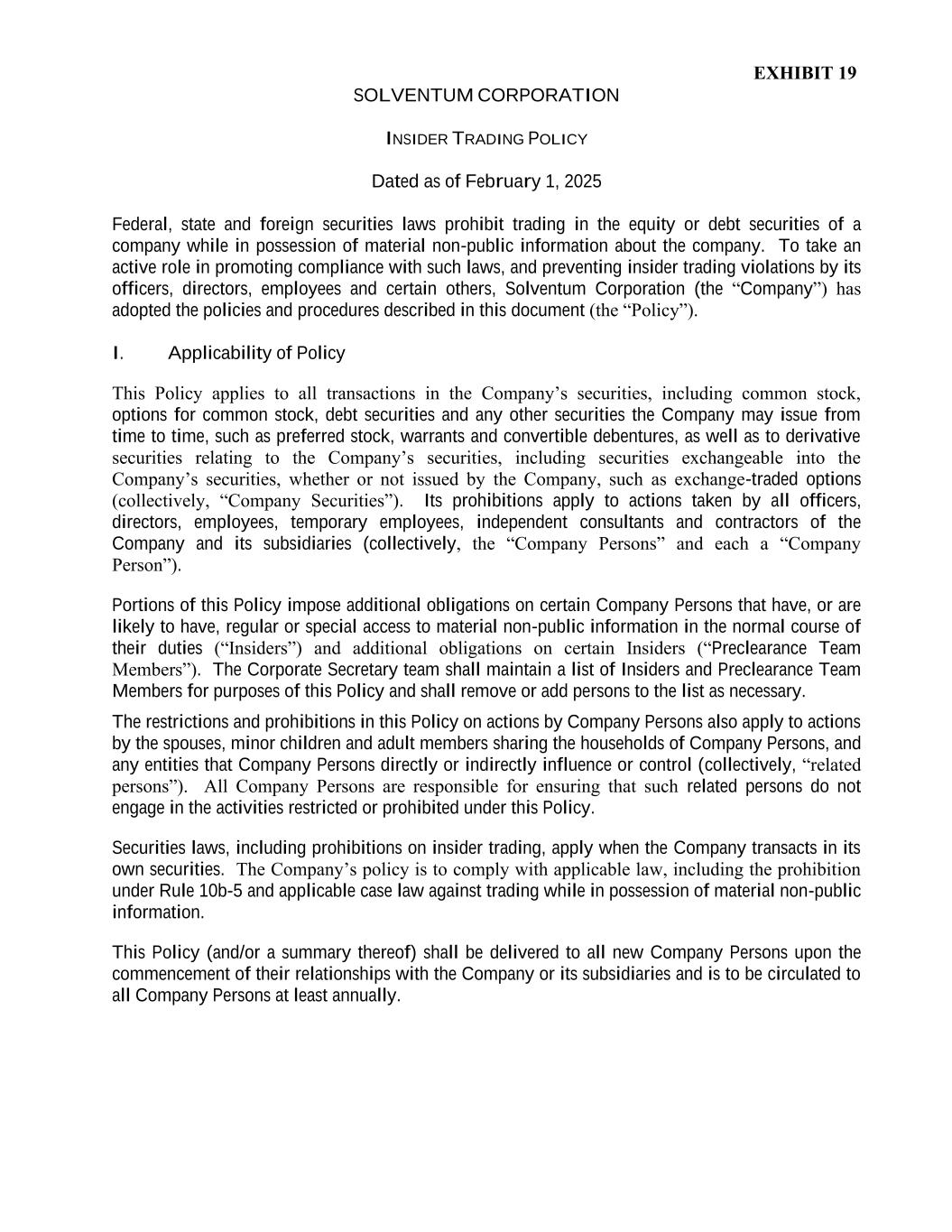
SOLVENTUM CORPORATION INSIDER TRADING POLICY Dated as of February 1, 2025 Federal, state and foreign securities laws prohibit trading in the equity or debt securities of a company while in possession of material non-public information about the company. To take an active role in promoting compliance with such laws, and preventing insider trading violations by its officers, directors, employees and certain others, Solventum Corporation (the “Company”) has adopted the policies and procedures described in this document (the “Policy”). I. Applicability of Policy This Policy applies to all transactions in the Company’s securities, including common stock, options for common stock, debt securities and any other securities the Company may issue from time to time, such as preferred stock, warrants and convertible debentures, as well as to derivative securities relating to the Company’s securities, including securities exchangeable into the Company’s securities, whether or not issued by the Company, such as exchange-traded options (collectively, “Company Securities”). Its prohibitions apply to actions taken by all officers, directors, employees, temporary employees, independent consultants and contractors of the Company and its subsidiaries (collectively, the “Company Persons” and each a “Company Person”). Portions of this Policy impose additional obligations on certain Company Persons that have, or are likely to have, regular or special access to material non-public information in the normal course of their duties (“Insiders”) and additional obligations on certain Insiders (“Preclearance Team Members”). The Corporate Secretary team shall maintain a list of Insiders and Preclearance Team Members for purposes of this Policy and shall remove or add persons to the list as necessary. The restrictions and prohibitions in this Policy on actions by Company Persons also apply to actions by the spouses, minor children and adult members sharing the households of Company Persons, and any entities that Company Persons directly or indirectly influence or control (collectively, “related persons”). All Company Persons are responsible for ensuring that such related persons do not engage in the activities restricted or prohibited under this Policy. Securities laws, including prohibitions on insider trading, apply when the Company transacts in its own securities. The Company’s policy is to comply with applicable law, including the prohibition under Rule 10b-5 and applicable case law against trading while in possession of material non-public information. This Policy (and/or a summary thereof) shall be delivered to all new Company Persons upon the commencement of their relationships with the Company or its subsidiaries and is to be circulated to all Company Persons at least annually. EXHIBIT 19
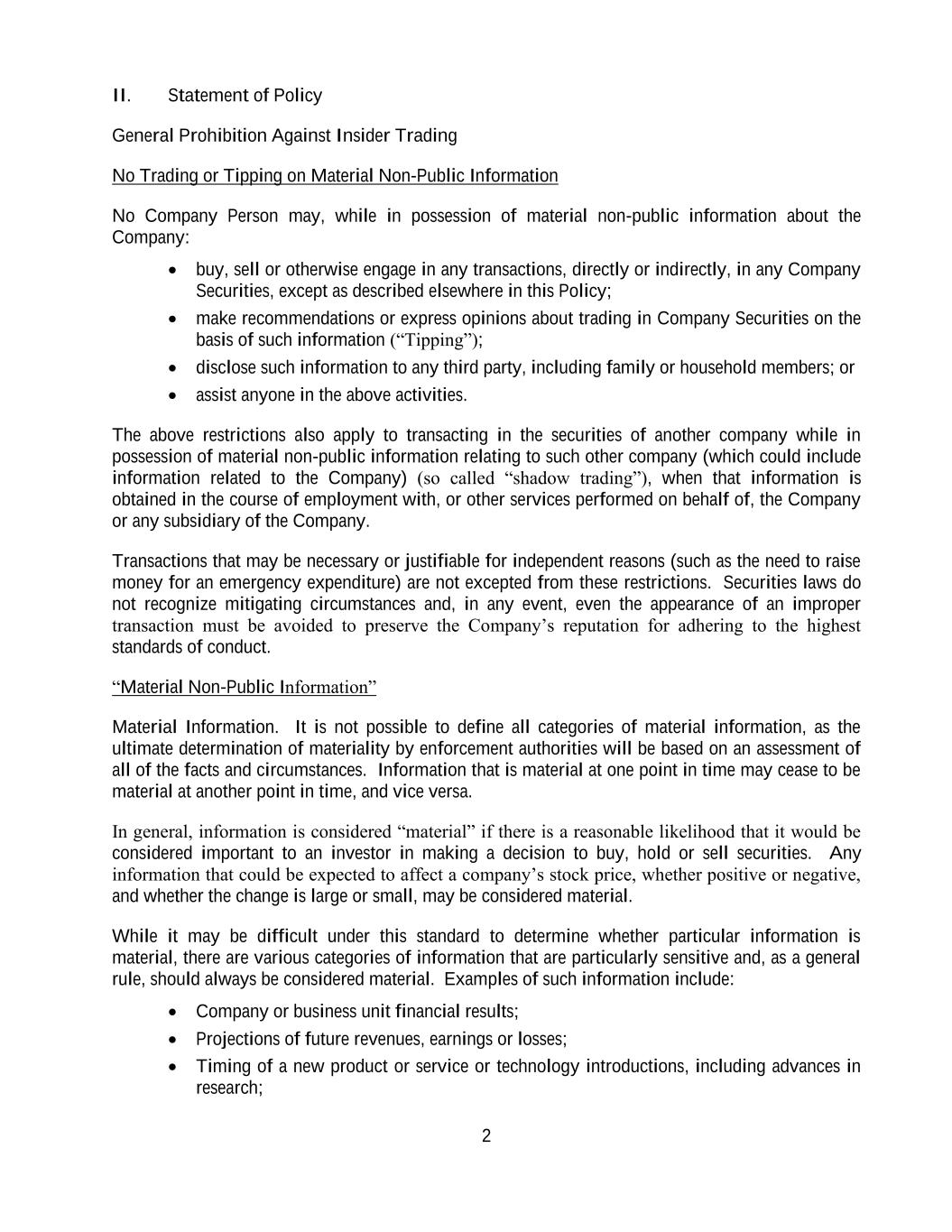
2 II. Statement of Policy General Prohibition Against Insider Trading No Trading or Tipping on Material Non-Public Information No Company Person may, while in possession of material non-public information about the Company: • buy, sell or otherwise engage in any transactions, directly or indirectly, in any Company Securities, except as described elsewhere in this Policy; • make recommendations or express opinions about trading in Company Securities on the basis of such information (“Tipping”); • disclose such information to any third party, including family or household members; or • assist anyone in the above activities. The above restrictions also apply to transacting in the securities of another company while in possession of material non-public information relating to such other company (which could include information related to the Company) (so called “shadow trading”), when that information is obtained in the course of employment with, or other services performed on behalf of, the Company or any subsidiary of the Company. Transactions that may be necessary or justifiable for independent reasons (such as the need to raise money for an emergency expenditure) are not excepted from these restrictions. Securities laws do not recognize mitigating circumstances and, in any event, even the appearance of an improper transaction must be avoided to preserve the Company’s reputation for adhering to the highest standards of conduct. “Material Non-Public Information” Material Information. It is not possible to define all categories of material information, as the ultimate determination of materiality by enforcement authorities will be based on an assessment of all of the facts and circumstances. Information that is material at one point in time may cease to be material at another point in time, and vice versa. In general, information is considered “material” if there is a reasonable likelihood that it would be considered important to an investor in making a decision to buy, hold or sell securities. Any information that could be expected to affect a company’s stock price, whether positive or negative, and whether the change is large or small, may be considered material. While it may be difficult under this standard to determine whether particular information is material, there are various categories of information that are particularly sensitive and, as a general rule, should always be considered material. Examples of such information include: • Company or business unit financial results; • Projections of future revenues, earnings or losses; • Timing of a new product or service or technology introductions, including advances in research;
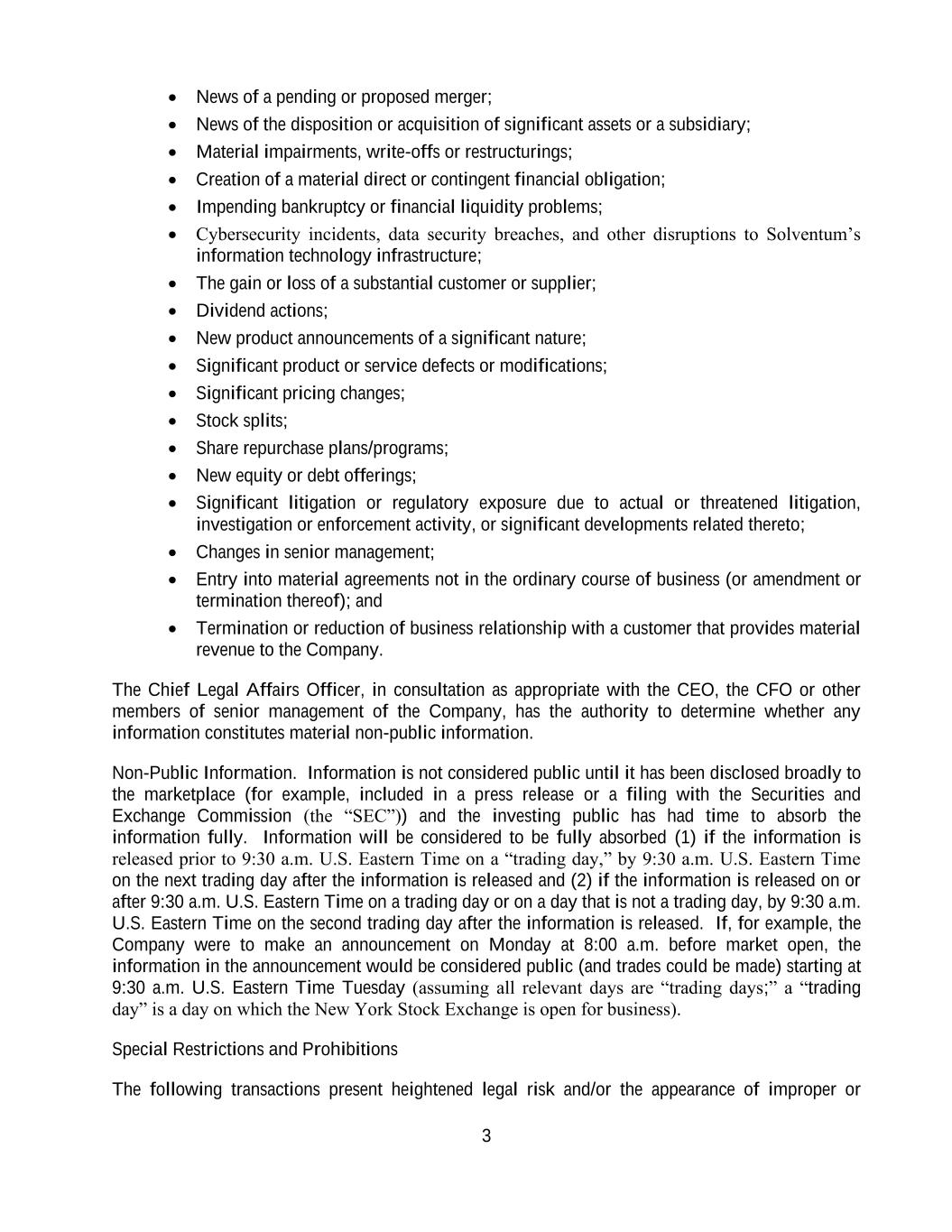
3 • News of a pending or proposed merger; • News of the disposition or acquisition of significant assets or a subsidiary; • Material impairments, write-offs or restructurings; • Creation of a material direct or contingent financial obligation; • Impending bankruptcy or financial liquidity problems; • Cybersecurity incidents, data security breaches, and other disruptions to Solventum’s information technology infrastructure; • The gain or loss of a substantial customer or supplier; • Dividend actions; • New product announcements of a significant nature; • Significant product or service defects or modifications; • Significant pricing changes; • Stock splits; • Share repurchase plans/programs; • New equity or debt offerings; • Significant litigation or regulatory exposure due to actual or threatened litigation, investigation or enforcement activity, or significant developments related thereto; • Changes in senior management; • Entry into material agreements not in the ordinary course of business (or amendment or termination thereof); and • Termination or reduction of business relationship with a customer that provides material revenue to the Company. The Chief Legal Affairs Officer, in consultation as appropriate with the CEO, the CFO or other members of senior management of the Company, has the authority to determine whether any information constitutes material non-public information. Non-Public Information. Information is not considered public until it has been disclosed broadly to the marketplace (for example, included in a press release or a filing with the Securities and Exchange Commission (the “SEC”)) and the investing public has had time to absorb the information fully. Information will be considered to be fully absorbed (1) if the information is released prior to 9:30 a.m. U.S. Eastern Time on a “trading day,” by 9:30 a.m. U.S. Eastern Time on the next trading day after the information is released and (2) if the information is released on or after 9:30 a.m. U.S. Eastern Time on a trading day or on a day that is not a trading day, by 9:30 a.m. U.S. Eastern Time on the second trading day after the information is released. If, for example, the Company were to make an announcement on Monday at 8:00 a.m. before market open, the information in the announcement would be considered public (and trades could be made) starting at 9:30 a.m. U.S. Eastern Time Tuesday (assuming all relevant days are “trading days;” a “trading day” is a day on which the New York Stock Exchange is open for business). Special Restrictions and Prohibitions The following transactions present heightened legal risk and/or the appearance of improper or
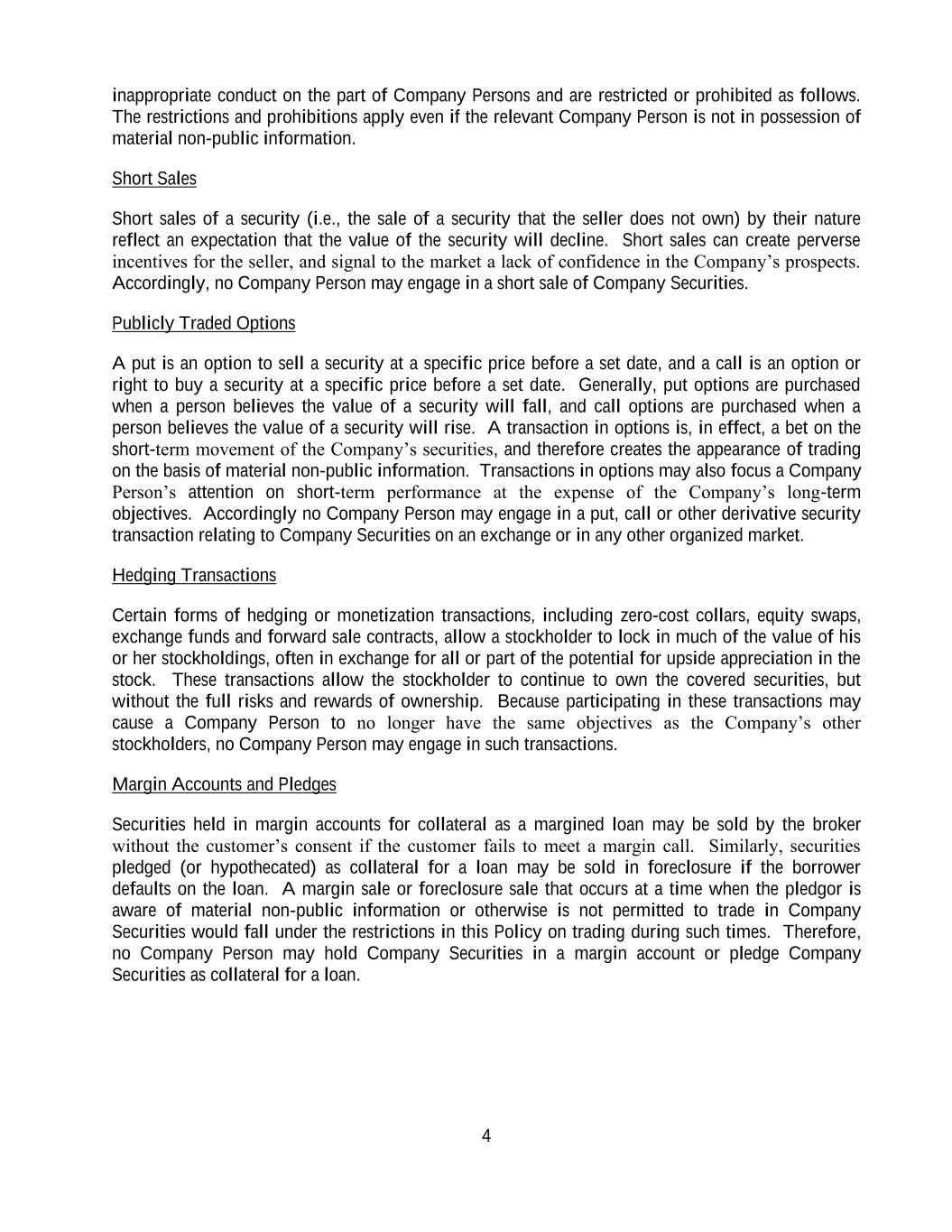
4 inappropriate conduct on the part of Company Persons and are restricted or prohibited as follows. The restrictions and prohibitions apply even if the relevant Company Person is not in possession of material non-public information. Short Sales Short sales of a security (i.e., the sale of a security that the seller does not own) by their nature reflect an expectation that the value of the security will decline. Short sales can create perverse incentives for the seller, and signal to the market a lack of confidence in the Company’s prospects. Accordingly, no Company Person may engage in a short sale of Company Securities. Publicly Traded Options A put is an option to sell a security at a specific price before a set date, and a call is an option or right to buy a security at a specific price before a set date. Generally, put options are purchased when a person believes the value of a security will fall, and call options are purchased when a person believes the value of a security will rise. A transaction in options is, in effect, a bet on the short-term movement of the Company’s securities, and therefore creates the appearance of trading on the basis of material non-public information. Transactions in options may also focus a Company Person’s attention on short-term performance at the expense of the Company’s long-term objectives. Accordingly no Company Person may engage in a put, call or other derivative security transaction relating to Company Securities on an exchange or in any other organized market. Hedging Transactions Certain forms of hedging or monetization transactions, including zero-cost collars, equity swaps, exchange funds and forward sale contracts, allow a stockholder to lock in much of the value of his or her stockholdings, often in exchange for all or part of the potential for upside appreciation in the stock. These transactions allow the stockholder to continue to own the covered securities, but without the full risks and rewards of ownership. Because participating in these transactions may cause a Company Person to no longer have the same objectives as the Company’s other stockholders, no Company Person may engage in such transactions. Margin Accounts and Pledges Securities held in margin accounts for collateral as a margined loan may be sold by the broker without the customer’s consent if the customer fails to meet a margin call. Similarly, securities pledged (or hypothecated) as collateral for a loan may be sold in foreclosure if the borrower defaults on the loan. A margin sale or foreclosure sale that occurs at a time when the pledgor is aware of material non-public information or otherwise is not permitted to trade in Company Securities would fall under the restrictions in this Policy on trading during such times. Therefore, no Company Person may hold Company Securities in a margin account or pledge Company Securities as collateral for a loan.
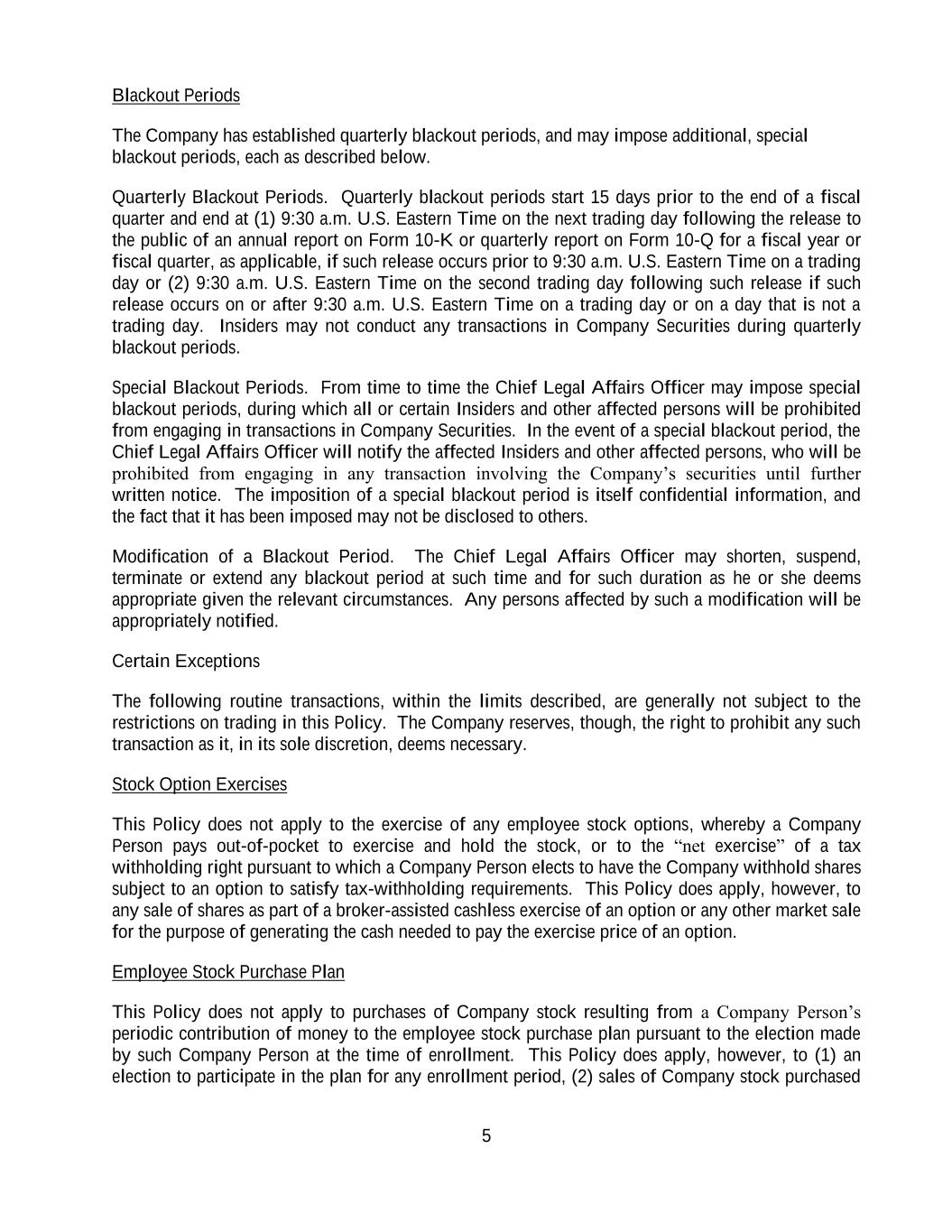
5 Blackout Periods The Company has established quarterly blackout periods, and may impose additional, special blackout periods, each as described below. Quarterly Blackout Periods. Quarterly blackout periods start 15 days prior to the end of a fiscal quarter and end at (1) 9:30 a.m. U.S. Eastern Time on the next trading day following the release to the public of an annual report on Form 10-K or quarterly report on Form 10-Q for a fiscal year or fiscal quarter, as applicable, if such release occurs prior to 9:30 a.m. U.S. Eastern Time on a trading day or (2) 9:30 a.m. U.S. Eastern Time on the second trading day following such release if such release occurs on or after 9:30 a.m. U.S. Eastern Time on a trading day or on a day that is not a trading day. Insiders may not conduct any transactions in Company Securities during quarterly blackout periods. Special Blackout Periods. From time to time the Chief Legal Affairs Officer may impose special blackout periods, during which all or certain Insiders and other affected persons will be prohibited from engaging in transactions in Company Securities. In the event of a special blackout period, the Chief Legal Affairs Officer will notify the affected Insiders and other affected persons, who will be prohibited from engaging in any transaction involving the Company’s securities until further written notice. The imposition of a special blackout period is itself confidential information, and the fact that it has been imposed may not be disclosed to others. Modification of a Blackout Period. The Chief Legal Affairs Officer may shorten, suspend, terminate or extend any blackout period at such time and for such duration as he or she deems appropriate given the relevant circumstances. Any persons affected by such a modification will be appropriately notified. Certain Exceptions The following routine transactions, within the limits described, are generally not subject to the restrictions on trading in this Policy. The Company reserves, though, the right to prohibit any such transaction as it, in its sole discretion, deems necessary. Stock Option Exercises This Policy does not apply to the exercise of any employee stock options, whereby a Company Person pays out-of-pocket to exercise and hold the stock, or to the “net exercise” of a tax withholding right pursuant to which a Company Person elects to have the Company withhold shares subject to an option to satisfy tax-withholding requirements. This Policy does apply, however, to any sale of shares as part of a broker-assisted cashless exercise of an option or any other market sale for the purpose of generating the cash needed to pay the exercise price of an option. Employee Stock Purchase Plan This Policy does not apply to purchases of Company stock resulting from a Company Person’s periodic contribution of money to the employee stock purchase plan pursuant to the election made by such Company Person at the time of enrollment. This Policy does apply, however, to (1) an election to participate in the plan for any enrollment period, (2) sales of Company stock purchased
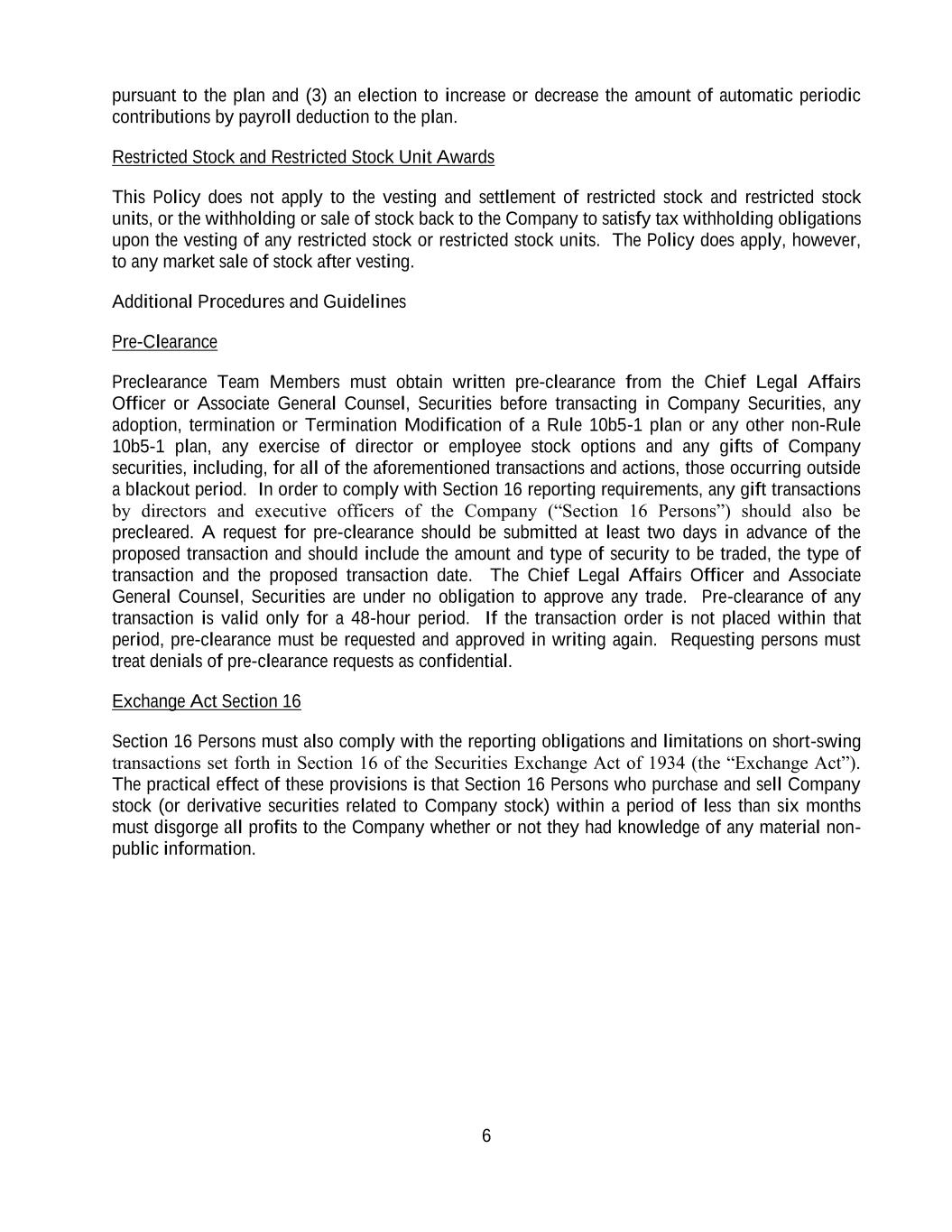
6 pursuant to the plan and (3) an election to increase or decrease the amount of automatic periodic contributions by payroll deduction to the plan. Restricted Stock and Restricted Stock Unit Awards This Policy does not apply to the vesting and settlement of restricted stock and restricted stock units, or the withholding or sale of stock back to the Company to satisfy tax withholding obligations upon the vesting of any restricted stock or restricted stock units. The Policy does apply, however, to any market sale of stock after vesting. Additional Procedures and Guidelines Pre-Clearance Preclearance Team Members must obtain written pre-clearance from the Chief Legal Affairs Officer or Associate General Counsel, Securities before transacting in Company Securities, any adoption, termination or Termination Modification of a Rule 10b5-1 plan or any other non-Rule 10b5-1 plan, any exercise of director or employee stock options and any gifts of Company securities, including, for all of the aforementioned transactions and actions, those occurring outside a blackout period. In order to comply with Section 16 reporting requirements, any gift transactions by directors and executive officers of the Company (“Section 16 Persons”) should also be precleared. A request for pre-clearance should be submitted at least two days in advance of the proposed transaction and should include the amount and type of security to be traded, the type of transaction and the proposed transaction date. The Chief Legal Affairs Officer and Associate General Counsel, Securities are under no obligation to approve any trade. Pre-clearance of any transaction is valid only for a 48-hour period. If the transaction order is not placed within that period, pre-clearance must be requested and approved in writing again. Requesting persons must treat denials of pre-clearance requests as confidential. Exchange Act Section 16 Section 16 Persons must also comply with the reporting obligations and limitations on short-swing transactions set forth in Section 16 of the Securities Exchange Act of 1934 (the “Exchange Act”). The practical effect of these provisions is that Section 16 Persons who purchase and sell Company stock (or derivative securities related to Company stock) within a period of less than six months must disgorge all profits to the Company whether or not they had knowledge of any material non- public information.
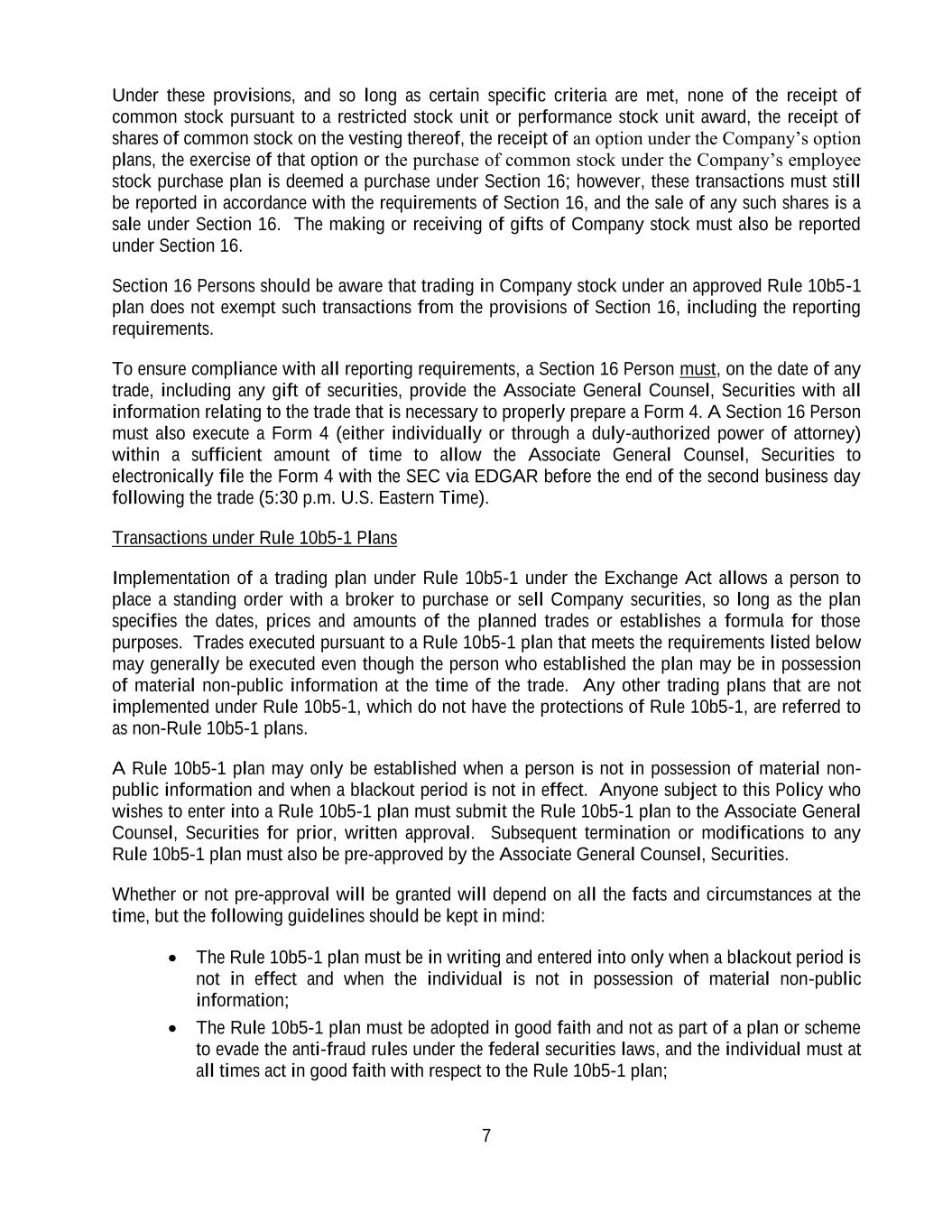
7 Under these provisions, and so long as certain specific criteria are met, none of the receipt of common stock pursuant to a restricted stock unit or performance stock unit award, the receipt of shares of common stock on the vesting thereof, the receipt of an option under the Company’s option plans, the exercise of that option or the purchase of common stock under the Company’s employee stock purchase plan is deemed a purchase under Section 16; however, these transactions must still be reported in accordance with the requirements of Section 16, and the sale of any such shares is a sale under Section 16. The making or receiving of gifts of Company stock must also be reported under Section 16. Section 16 Persons should be aware that trading in Company stock under an approved Rule 10b5-1 plan does not exempt such transactions from the provisions of Section 16, including the reporting requirements. To ensure compliance with all reporting requirements, a Section 16 Person must, on the date of any trade, including any gift of securities, provide the Associate General Counsel, Securities with all information relating to the trade that is necessary to properly prepare a Form 4. A Section 16 Person must also execute a Form 4 (either individually or through a duly-authorized power of attorney) within a sufficient amount of time to allow the Associate General Counsel, Securities to electronically file the Form 4 with the SEC via EDGAR before the end of the second business day following the trade (5:30 p.m. U.S. Eastern Time). Transactions under Rule 10b5-1 Plans Implementation of a trading plan under Rule 10b5-1 under the Exchange Act allows a person to place a standing order with a broker to purchase or sell Company securities, so long as the plan specifies the dates, prices and amounts of the planned trades or establishes a formula for those purposes. Trades executed pursuant to a Rule 10b5-1 plan that meets the requirements listed below may generally be executed even though the person who established the plan may be in possession of material non-public information at the time of the trade. Any other trading plans that are not implemented under Rule 10b5-1, which do not have the protections of Rule 10b5-1, are referred to as non-Rule 10b5-1 plans. A Rule 10b5-1 plan may only be established when a person is not in possession of material non- public information and when a blackout period is not in effect. Anyone subject to this Policy who wishes to enter into a Rule 10b5-1 plan must submit the Rule 10b5-1 plan to the Associate General Counsel, Securities for prior, written approval. Subsequent termination or modifications to any Rule 10b5-1 plan must also be pre-approved by the Associate General Counsel, Securities. Whether or not pre-approval will be granted will depend on all the facts and circumstances at the time, but the following guidelines should be kept in mind: • The Rule 10b5-1 plan must be in writing and entered into only when a blackout period is not in effect and when the individual is not in possession of material non-public information; • The Rule 10b5-1 plan must be adopted in good faith and not as part of a plan or scheme to evade the anti-fraud rules under the federal securities laws, and the individual must at all times act in good faith with respect to the Rule 10b5-1 plan;
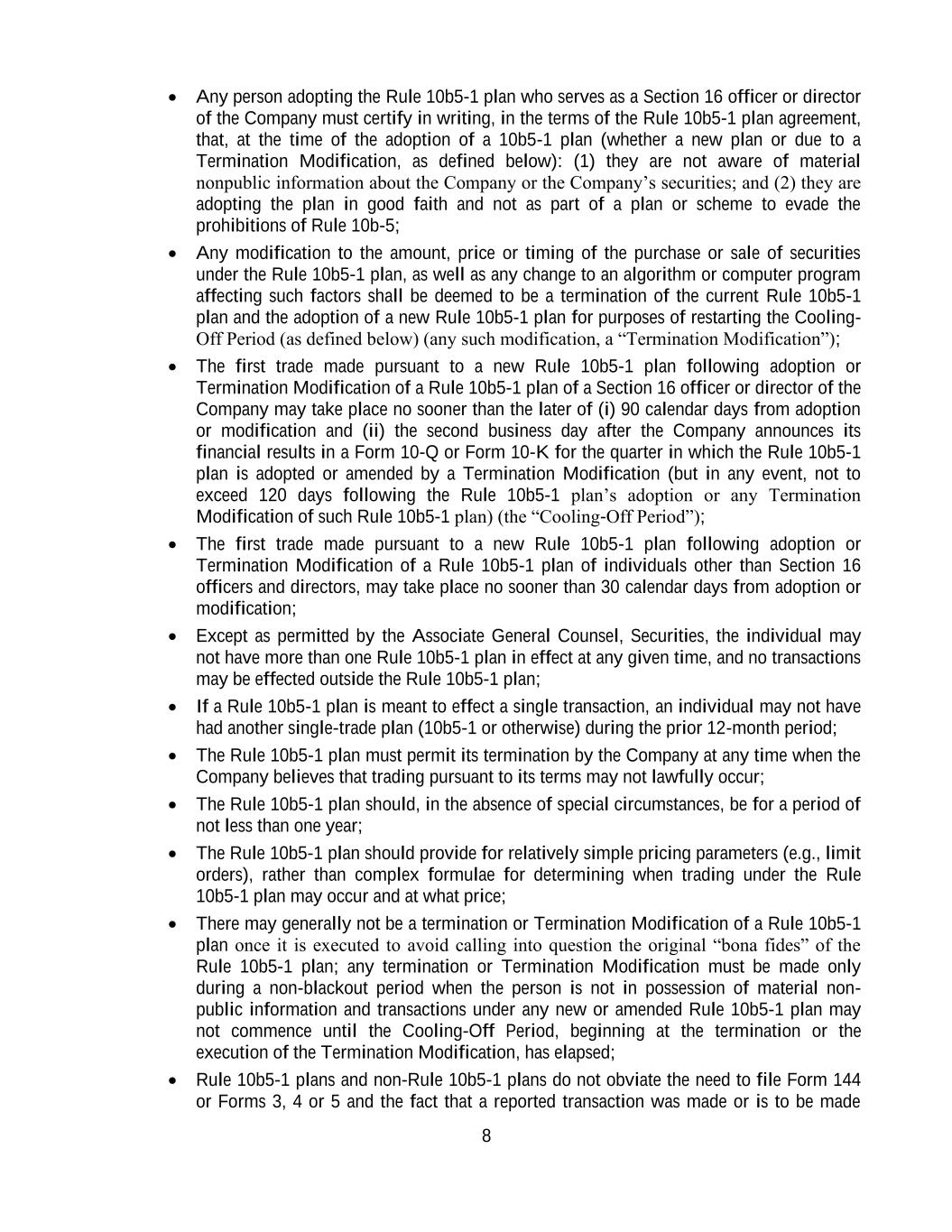
8 • Any person adopting the Rule 10b5-1 plan who serves as a Section 16 officer or director of the Company must certify in writing, in the terms of the Rule 10b5-1 plan agreement, that, at the time of the adoption of a 10b5-1 plan (whether a new plan or due to a Termination Modification, as defined below): (1) they are not aware of material nonpublic information about the Company or the Company’s securities; and (2) they are adopting the plan in good faith and not as part of a plan or scheme to evade the prohibitions of Rule 10b-5; • Any modification to the amount, price or timing of the purchase or sale of securities under the Rule 10b5-1 plan, as well as any change to an algorithm or computer program affecting such factors shall be deemed to be a termination of the current Rule 10b5-1 plan and the adoption of a new Rule 10b5-1 plan for purposes of restarting the Cooling- Off Period (as defined below) (any such modification, a “Termination Modification”); • The first trade made pursuant to a new Rule 10b5-1 plan following adoption or Termination Modification of a Rule 10b5-1 plan of a Section 16 officer or director of the Company may take place no sooner than the later of (i) 90 calendar days from adoption or modification and (ii) the second business day after the Company announces its financial results in a Form 10-Q or Form 10-K for the quarter in which the Rule 10b5-1 plan is adopted or amended by a Termination Modification (but in any event, not to exceed 120 days following the Rule 10b5-1 plan’s adoption or any Termination Modification of such Rule 10b5-1 plan) (the “Cooling-Off Period”); • The first trade made pursuant to a new Rule 10b5-1 plan following adoption or Termination Modification of a Rule 10b5-1 plan of individuals other than Section 16 officers and directors, may take place no sooner than 30 calendar days from adoption or modification; • Except as permitted by the Associate General Counsel, Securities, the individual may not have more than one Rule 10b5-1 plan in effect at any given time, and no transactions may be effected outside the Rule 10b5-1 plan; • If a Rule 10b5-1 plan is meant to effect a single transaction, an individual may not have had another single-trade plan (10b5-1 or otherwise) during the prior 12-month period; • The Rule 10b5-1 plan must permit its termination by the Company at any time when the Company believes that trading pursuant to its terms may not lawfully occur; • The Rule 10b5-1 plan should, in the absence of special circumstances, be for a period of not less than one year; • The Rule 10b5-1 plan should provide for relatively simple pricing parameters (e.g., limit orders), rather than complex formulae for determining when trading under the Rule 10b5-1 plan may occur and at what price; • There may generally not be a termination or Termination Modification of a Rule 10b5-1 plan once it is executed to avoid calling into question the original “bona fides” of the Rule 10b5-1 plan; any termination or Termination Modification must be made only during a non-blackout period when the person is not in possession of material non- public information and transactions under any new or amended Rule 10b5-1 plan may not commence until the Cooling-Off Period, beginning at the termination or the execution of the Termination Modification, has elapsed; • Rule 10b5-1 plans and non-Rule 10b5-1 plans do not obviate the need to file Form 144 or Forms 3, 4 or 5 and the fact that a reported transaction was made or is to be made
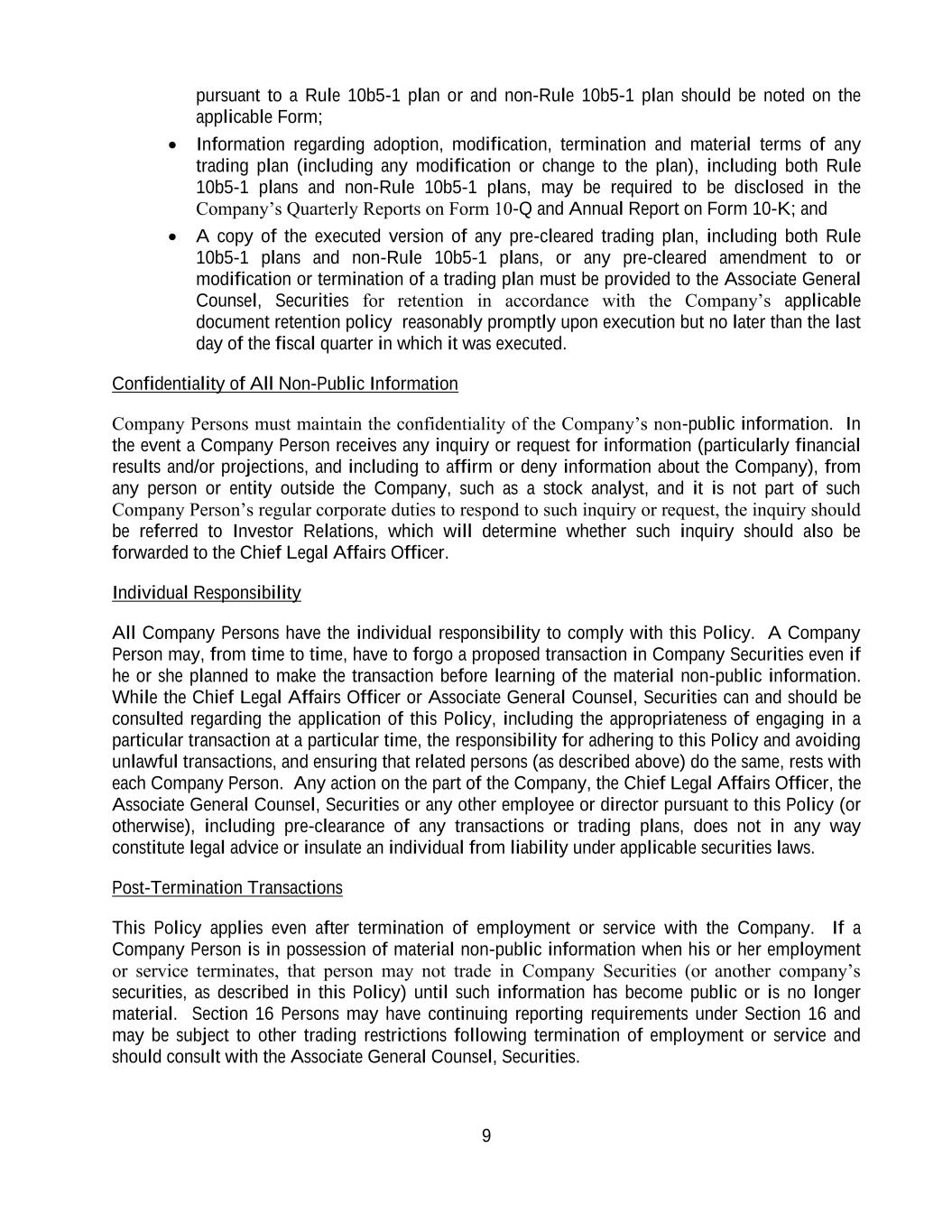
9 pursuant to a Rule 10b5-1 plan or and non-Rule 10b5-1 plan should be noted on the applicable Form; • Information regarding adoption, modification, termination and material terms of any trading plan (including any modification or change to the plan), including both Rule 10b5-1 plans and non-Rule 10b5-1 plans, may be required to be disclosed in the Company’s Quarterly Reports on Form 10-Q and Annual Report on Form 10-K; and • A copy of the executed version of any pre-cleared trading plan, including both Rule 10b5-1 plans and non-Rule 10b5-1 plans, or any pre-cleared amendment to or modification or termination of a trading plan must be provided to the Associate General Counsel, Securities for retention in accordance with the Company’s applicable document retention policy reasonably promptly upon execution but no later than the last day of the fiscal quarter in which it was executed. Confidentiality of All Non-Public Information Company Persons must maintain the confidentiality of the Company’s non-public information. In the event a Company Person receives any inquiry or request for information (particularly financial results and/or projections, and including to affirm or deny information about the Company), from any person or entity outside the Company, such as a stock analyst, and it is not part of such Company Person’s regular corporate duties to respond to such inquiry or request, the inquiry should be referred to Investor Relations, which will determine whether such inquiry should also be forwarded to the Chief Legal Affairs Officer. Individual Responsibility All Company Persons have the individual responsibility to comply with this Policy. A Company Person may, from time to time, have to forgo a proposed transaction in Company Securities even if he or she planned to make the transaction before learning of the material non-public information. While the Chief Legal Affairs Officer or Associate General Counsel, Securities can and should be consulted regarding the application of this Policy, including the appropriateness of engaging in a particular transaction at a particular time, the responsibility for adhering to this Policy and avoiding unlawful transactions, and ensuring that related persons (as described above) do the same, rests with each Company Person. Any action on the part of the Company, the Chief Legal Affairs Officer, the Associate General Counsel, Securities or any other employee or director pursuant to this Policy (or otherwise), including pre-clearance of any transactions or trading plans, does not in any way constitute legal advice or insulate an individual from liability under applicable securities laws. Post-Termination Transactions This Policy applies even after termination of employment or service with the Company. If a Company Person is in possession of material non-public information when his or her employment or service terminates, that person may not trade in Company Securities (or another company’s securities, as described in this Policy) until such information has become public or is no longer material. Section 16 Persons may have continuing reporting requirements under Section 16 and may be subject to other trading restrictions following termination of employment or service and should consult with the Associate General Counsel, Securities.
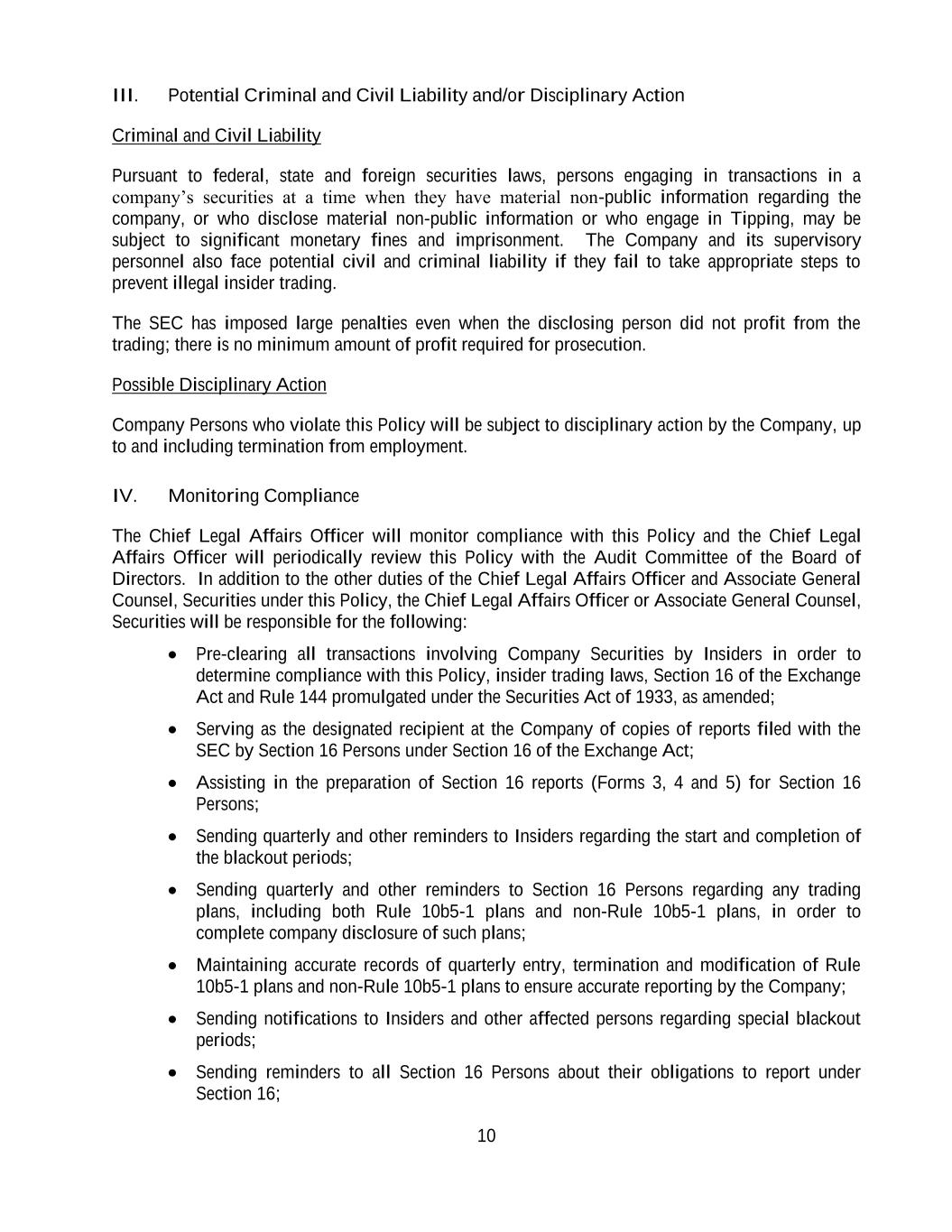
10 III. Potential Criminal and Civil Liability and/or Disciplinary Action Criminal and Civil Liability Pursuant to federal, state and foreign securities laws, persons engaging in transactions in a company’s securities at a time when they have material non-public information regarding the company, or who disclose material non-public information or who engage in Tipping, may be subject to significant monetary fines and imprisonment. The Company and its supervisory personnel also face potential civil and criminal liability if they fail to take appropriate steps to prevent illegal insider trading. The SEC has imposed large penalties even when the disclosing person did not profit from the trading; there is no minimum amount of profit required for prosecution. Possible Disciplinary Action Company Persons who violate this Policy will be subject to disciplinary action by the Company, up to and including termination from employment. IV. Monitoring Compliance The Chief Legal Affairs Officer will monitor compliance with this Policy and the Chief Legal Affairs Officer will periodically review this Policy with the Audit Committee of the Board of Directors. In addition to the other duties of the Chief Legal Affairs Officer and Associate General Counsel, Securities under this Policy, the Chief Legal Affairs Officer or Associate General Counsel, Securities will be responsible for the following: • Pre-clearing all transactions involving Company Securities by Insiders in order to determine compliance with this Policy, insider trading laws, Section 16 of the Exchange Act and Rule 144 promulgated under the Securities Act of 1933, as amended; • Serving as the designated recipient at the Company of copies of reports filed with the SEC by Section 16 Persons under Section 16 of the Exchange Act; • Assisting in the preparation of Section 16 reports (Forms 3, 4 and 5) for Section 16 Persons; • Sending quarterly and other reminders to Insiders regarding the start and completion of the blackout periods; • Sending quarterly and other reminders to Section 16 Persons regarding any trading plans, including both Rule 10b5-1 plans and non-Rule 10b5-1 plans, in order to complete company disclosure of such plans; • Maintaining accurate records of quarterly entry, termination and modification of Rule 10b5-1 plans and non-Rule 10b5-1 plans to ensure accurate reporting by the Company; • Sending notifications to Insiders and other affected persons regarding special blackout periods; • Sending reminders to all Section 16 Persons about their obligations to report under Section 16;
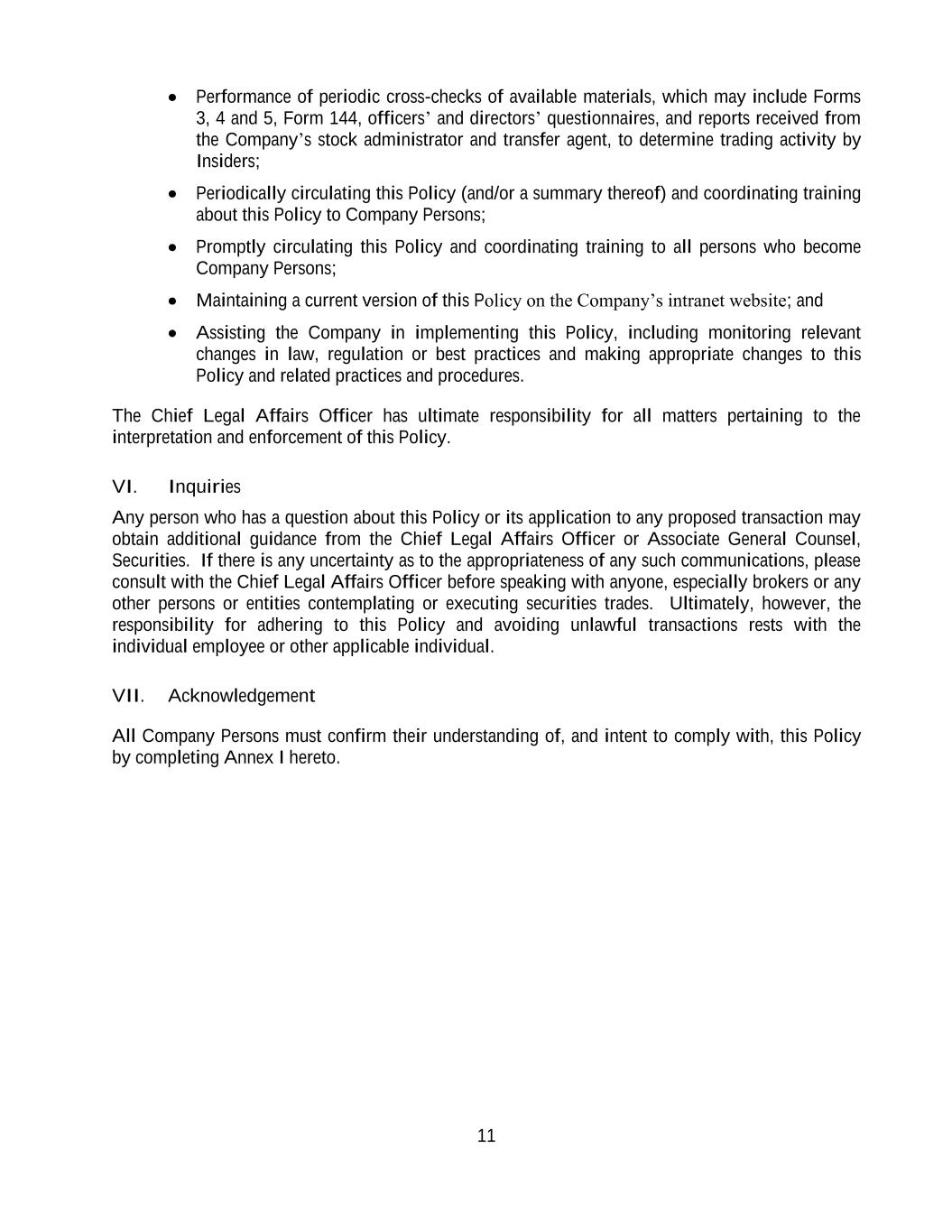
11 • Performance of periodic cross-checks of available materials, which may include Forms 3, 4 and 5, Form 144, officers’ and directors’ questionnaires, and reports received from the Company’s stock administrator and transfer agent, to determine trading activity by Insiders; • Periodically circulating this Policy (and/or a summary thereof) and coordinating training about this Policy to Company Persons; • Promptly circulating this Policy and coordinating training to all persons who become Company Persons; • Maintaining a current version of this Policy on the Company’s intranet website; and • Assisting the Company in implementing this Policy, including monitoring relevant changes in law, regulation or best practices and making appropriate changes to this Policy and related practices and procedures. The Chief Legal Affairs Officer has ultimate responsibility for all matters pertaining to the interpretation and enforcement of this Policy. VI. Inquiries Any person who has a question about this Policy or its application to any proposed transaction may obtain additional guidance from the Chief Legal Affairs Officer or Associate General Counsel, Securities. If there is any uncertainty as to the appropriateness of any such communications, please consult with the Chief Legal Affairs Officer before speaking with anyone, especially brokers or any other persons or entities contemplating or executing securities trades. Ultimately, however, the responsibility for adhering to this Policy and avoiding unlawful transactions rests with the individual employee or other applicable individual. VII. Acknowledgement All Company Persons must confirm their understanding of, and intent to comply with, this Policy by completing Annex I hereto.
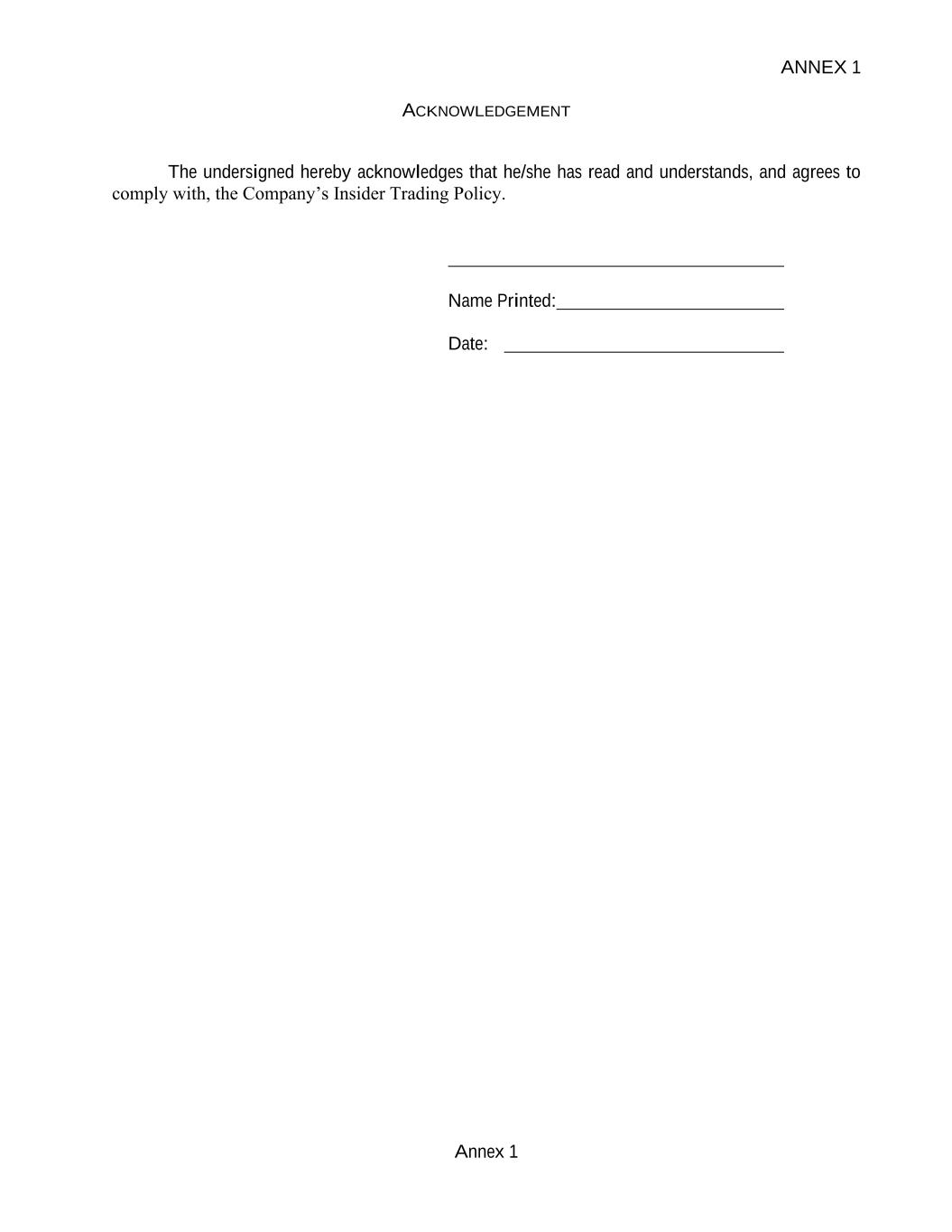
ANNEX 1 Annex 1 ACKNOWLEDGEMENT The undersigned hereby acknowledges that he/she has read and understands, and agrees to comply with, the Company’s Insider Trading Policy. Name Printed: Date: